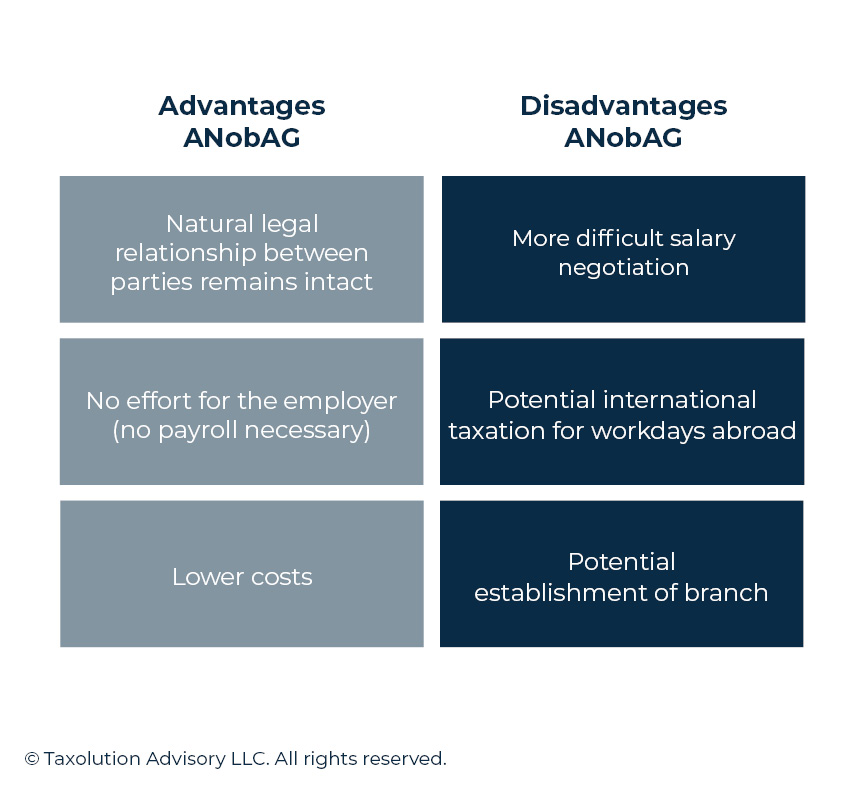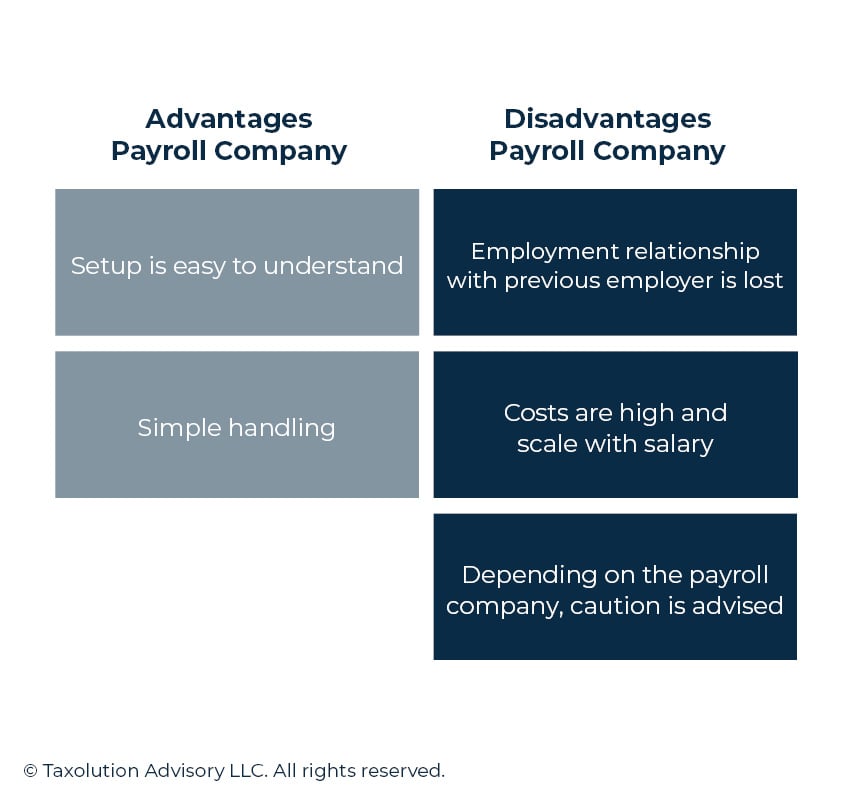ANobAG vs Payroll Company

If you live in Switzerland and work for an employer who does not have a place of business in Switzerland, the employment relationship is subject to a number of peculiarities because the employer is not subject to social security contributions in Switzerland. To avoid legal problems for the employee and employer due to pseudo self-employment, there are two ways for the employee to legally pursue the employment relationship: either as an ANobAG or by registering with a payroll company. In this article, we explain to you what the two setups are all about and where the advantages and disadvantages of the two models lie.
What is ANobAG?
« From a social security perspective, the employment relationship is only legal if both the employer and employee contributions are paid. To this end, the concept of ANobAG was introduced, whereby the employee registers as such and henceforth pays both contributions to the social security system. »
The abbreviation ANobAG stands for employee without a contributing employer. Since the social security law in Switzerland stipulates that both employer and employee pay pro rata contributions into the social security system, the following problem arises in the constellation “employee in Switzerland – employer abroad”: The employer is not liable for social security contributions in Switzerland if he has no place of business here. This means that the only person liable to pay contributions is the employee living in Switzerland.
From a social security perspective, the employment relationship is only legal if both the employer and employee contributions are paid. To this end, the concept of ANobAG was introduced, whereby the employee registers as such and henceforth pays both contributions to the social security system.
Switzerland has an agreement with the EU/EFTA states that obliges the foreign employer to pay social security contributions in Switzerland. In this case, the employer transfers the additional social security contribution to the ANobAG with the salary. The ANobAG then pays both shares to the social insurance.
If the ANobAG’s employer is located in a third country, there is no such agreement. This means that the ANobAG must then either negotiate with their employer themselves so that the latter transfers the contributions with the salary, or the ANobAG must pay the contributions completely himself from their salary.
What Are the Duties of An ANobAG?
With the status as an ANobAG (and employer in the EU/EFTA area), contributions must be made to the following social insurance schemes:
Contributions for the 1st Pillar
Both ANobAG and the foreign employer must register with Swiss social security. The ANobAG agrees with his employer that he will transfer the employer amounts to the social insurance. The amount of the contribution rates is based on those in the canton of residence of the ANobAG.
It is paid into all 1st pillar insurances:
- AHV: Old-age and survivors insurance
- IV: Disability insurance
- EO: Income replacement regulation
Contributions for the
2nd Pillar
The ANobAG must join an occupational pension scheme (BVG) as provided for in the 2nd pillar.
Accident
Insurance
Likewise, accident insurance (UVG) must be taken out.
Family
Allowance
The family allowance is payable by the ANobAG. Depending on the canton, this allowance varies in the amount of the contribution rates.
Administrative
Expenses
An administrative fee, the amount of which varies from canton to canton and amounts to a maximum of 3% of the AHV contribution, is also due.
The amount of the contributions (as of 01.01.2021) can be found in the following table:
| Social Security | Contribution Rate (Employee + Employer Contribution) |
| AHV/IV/EO | 10,6% |
| ALV (up to CHF 148,200) | 2,2% |
| ALV (from CHF 148,201) | 1,0% |
| Family allowance | varies depending on the canton (1.1% – 2.83%) |
| Administrative expenses | max. 3% of the AHV contribution |
| Accident insurance | Varies depending on the contract |
| occupational pension plan (BVG) | Varies depending on the contract |
If the employer is not based in the EU/EFTA area, there is no obligation to join the occupational pension scheme. However, this can be taken out voluntarily.
What Are the Advantages and Disadvantages of The Anobag Model?
Advantages ANobAG
- Natural Legal Relationship Between Parties Remains Intact
The great advantage of the ANobAG model is that the employment relationship remains with the employer abroad. It is therefore the natural legal relationship, as the de facto employer also remains the contractual employer. This is important from many points of view, but especially in terms of legal certainty between the two contracting parties.
- No Effort for the Employer (No Payroll Necessary)
Moreover, it is as easy for the employer to handle as with a contractor. Namely, there is no need for payroll work, as this burden is transferred to the employee.
- Lower Costs
In addition, the cost of running an ANobAG model is lower than a payroll company because there is no need for another party between the employer and employee.
Disadvantages ANobAG
- More Difficult Salary Negotiation
However, the ANobAG model is not without its drawbacks. When negotiating the salary, it is necessary to make sure that the employer and the employee are talking about the same thing. Does the transferred salary represent the gross salary or should it cover all costs, i.e. gross salary + employer contributions? What is the employee’s take-home salary in each case? This problem can be easily solved with the appropriate support.
- Potential International Taxation for Workdays Abroad
There are two other aspects that should not be ignored. If the employee performs part of his work while physically staying in the country of the employer, these working days could be taxed in the respective country. Therefore, in case of regular work with stay in the country of the employer, another solution should be used – we will advise you on this without any obligation.
- Potential Establishment of Branch
In addition, it must be secured that the employee does not establish a branch of the employer. This does not happen so quickly, but you should be informed about the criteria so that there are no surprises.
What Is a Payroll Company?
A payroll company can be an alternative for the ANobAG model. In this case, the employee is employed by the payroll company in Switzerland. The payroll company then invoices the employer based on the employee’s performance and then pays the employee.
The payroll company takes care of paying the social security contributions in the same way as an “ordinary Swiss employer”. The payroll company therefore pays the net wage to the employee after deducting the employee contributions and charges the “employer” abroad the total wage costs (including social security) plus a (usually) percentage-based commission.
What Are the Benefits of a Payroll Company?
The employee enjoys the following benefits when employed by a payroll company:
- Setup Is Easy to Understand
The concept of payroll companies is simple and easy to understand for both parties.
- Simple Handling
The process is simple for both parties: the payroll company enters into a contract with the de facto employer and hires the employee. The entire administrative effort lies with the payroll company.
What Are the Disadvantages of a Payroll Company?
As attractive as a working relationship with the employer abroad via a payroll company may seem at first glance, it comes with disadvantages:
- Employment Relationship With Previous Employer Is Lost
The employee must terminate his employment contract with the previous employer and then be re-employed by the payroll company. There is therefore no direct contractual relationship between the employee in Switzerland and the employer abroad. This can be particularly problematic in the case of legal disputes or, for example, specific salary models such as employee share ownership.
- Costs Are High and Scale With Salary
Since the costs of the payroll companies are usually based on percentages, there are considerable cost differences, especially for higher salaries, compared to the ANobAG model, in which the costs are determined independently of the salary. The difference can quickly amount to several thousand francs per year – which could otherwise be used additionally as salary or saved for the employer, or both (when the savings are shared).
- Depending on the Payroll Company, Caution Is Advised
There are payroll companies that advertise attractive conditions but then fail to deliver what they promise. An example of this is when weekly commuting employees are promised that travel costs and other expenses can be reimbursed tax-free. However, without approved expense regulations, this is not compliant and such expenses can hardly be approved. This can have serious consequences for the employer abroad (through contractual passing on of liability) and also employees (through after-tax proceedings), as the tax office can levy taxes on the “lump sums” paid out. Thorough screening before contracting with a payroll company is therefore essential to reduce the risk of being hired by a “black sheep”. If an expense policy is advertised, it should be available for reviewing upon request.
Anobag vs Payroll – Which Is Better Now?
It is not possible to make a general statement as to whether it is better to register as an ANobAG or as an employee with a payroll company. The individual case and the respective circumstances must be considered.
The following table shows the main features of the two models:
| ANobAG | Payroll | |
| Where is the employee employed? | Remains employed by the employer abroad (natural legal relationship) | Is employed by the payroll company (triangular relationship) |
| Social security in Switzerland | Yes (1st and potentially 2nd pillar) | Yes (1st and 2nd pillar) |
| Responsible for administration | Employees (substitution possible) | Payroll Company |
| Price | More cost efficient as no third party is involved | High cost due to scaling price |
| Potential hurdles | Salary negotiation
International taxation during stay abroad Branches | Legal uncertainty in the event of conflict
Black sheep in highly competitive market Risk does not lie with the payroll company
|
If you have any further questions about your individual work situation, don’t hesitate to contact us with a non-binding request. We will be glad to help you with an individual consultation.




